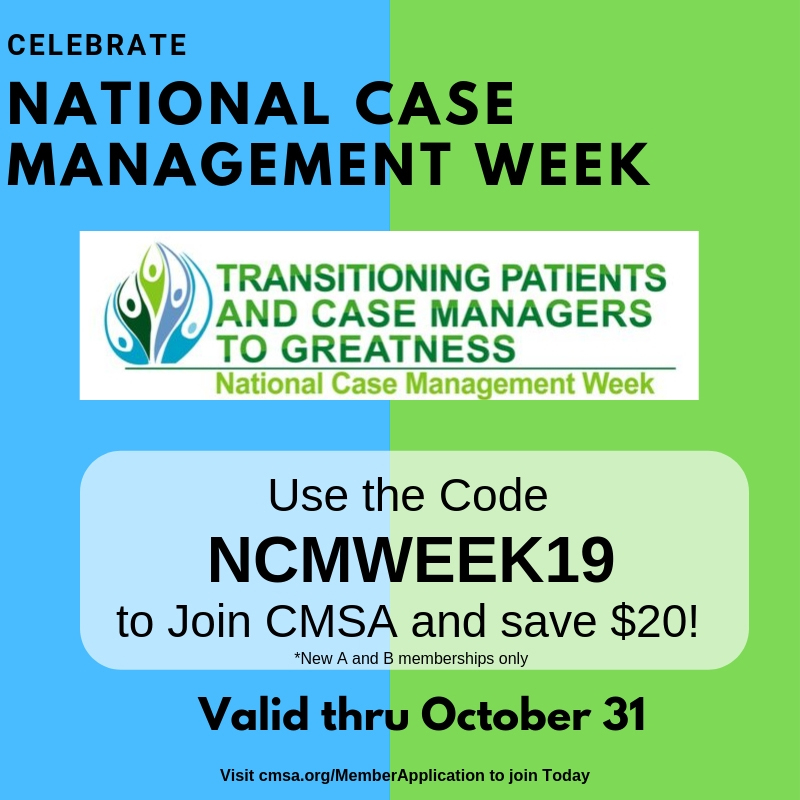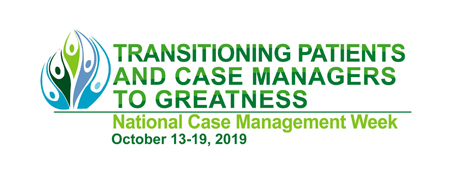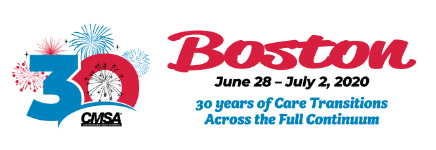Case Managers Make a Difference Every Day
![]() Print this Article | Send to Colleague
Print this Article | Send to Colleague
Pat Stricker, RN, MEd
Happy Case Management Week! Once again it is your time to be congratulated and celebrated for all the excellent work you do. As professional case managers, you provide quality patient-centered care, support, advocacy and safe, effective care coordination and transitions, while improving the patient experience and health outcomes. It is not easy being a case manager, but your unique skillset allows you to navigate and manage difficult care transitions in our changing healthcare environment. You are a valuable resource to your organization and to the patients and families you serve. You truly make a difference every day (not just this week)! Thank you for everything you do.
So….. What Is a Case Manager?
The purpose of National Case Management Week is to congratulate and celebrate case managers for the work they do, but a secondary goal is to educate others in the community about case management and the role and importance of case managers. CMSA describes case management as “a collaborative process of assessment, planning, facilitation, care coordination, evaluation and advocacy for options and services to meet an individual’s and family’s comprehensive health needs through communication and available resources to promote patient safety, quality of care, and cost effective outcomes… Case management serves as a means for achieving client wellness and autonomy through advocacy, communication, education, identification of service resources and service facilitation.”
The Merriam-Webster dictionary describes a case manager as “a person (as a social worker or nurse) who assists in the planning, coordination, monitoring, and evaluation of medical services for a patient with emphasis on quality of care, continuity of services, and cost-effectiveness.” In addition, CMSA says, “the case manager helps identify appropriate providers and facilities throughout the continuum of services, while ensuring that available resources are being used in a timely and cost-effective manner in order to obtain optimum value for both the client and the reimbursement source.”
Case managers are: educators who help patients understand their health status, what they can do about it, and why treatments are important; advocates who enable their patients to achieve their goals more effectively and efficiently; navigators who help steer their patients through the healthcare system; and facilitators who assure organization, structure and consistency for the patient, families and healthcare delivery team.
The following attributes describe the role of a case manager:
C oordinator, Care Planner, Collaborator, Communicator, Critical Thinker, Confidant, Counselor
A dvocate, Achiever, Accessible
S upporter, Shared Decision-maker, Service Facilitator
E ducator, Efficient, Experienced
M ediator, Mentor, Motivator, Monitor
A dvisor, Accountable, Autonomous
N avigator, Negotiator
A ssessor, Activator, Attentive
G oal-setter, Guardian
E mpowerer, Encourager, Evaluator
R esource, Record keeper (documenter), Researcher, Relationship Manager
In addition, a case manager is a problem-solver, implementer, innovator, and an invaluable member of
the healthcare team.
To celebrate National Case Management Week, CMSA is offering a special membership promotion. For those of you who are not current members, CMSA is offering a $20 discount (see details at bottom of page) on new individual memberships. But don’t wait. This offer is only valid through October 31st.

The Importance of Care Transitions
Managing care transitions is one of the key goals for case managers. That is why CMSA has chosen “care transition” as the theme for National Case Management Week (Transitioning Patients and Case Managers to Greatness) and for the 2020 Annual Conference and Expo (30 Years of Care Transitions Across the Full Continuum).
 |
 |
In the early 2000s, CMSA was working on identifying and defining gaps in transitions of care that were impacting the safety and quality of care. In 2006 CMSA and Sanofi U.S. founded the National Transition of Care Coalition (NTOCC) to “raise awareness about transitions of care among healthcare professionals, government leaders, patients and caregivers to increase the quality of care, reduce medication errors and enhance clinical outcomes.” NTOCC’s goals were to identify and define transition gaps in care impacting the safety and quality of care, as well as develop, implement and evaluate solutions that would benefit patients. Since then NTOCC has become an independent 501(c) (4) organization that provides innovative, quality transitional care learning resources for healthcare professionals and consumers. These include white papers and statements defining transition issues, as well as tools that provide safer care transition solutions. The Advisors Council (30 industry-leading associations, medical specialty societies, standards bodies, regulators and government organizations) guides and develops the NTOCC tools and resources and over 450 organizations review, test, critique and implement the tools and material. These care transition initiatives are helping to change healthcare delivery by creating better, safer patient outcomes at reduced costs.
Also in the early 2000s, an article on The Importance of Transitional Care in Achieving Health Reform summarized 21 randomized clinical trials of transitional care interventions. It identified nine interventions that validated reductions in hospital readmissions within 30 days, and many of these interventions included clinical nurse managers. Based on this review, transitional care strategies were recommended for inclusion in the Affordable Care Act of 2010 because they were designed to “ensure health care continuity, avoid preventable poor outcomes among at-risk populations, and promote the safe and timely transfer of patients from one level of care to another or from one type of setting to another.” Since then, these transitional care interventions and others have become a key component of case management.
CMSA’s 30th Annual Conference and Expo
The care transition theme will also be a focus of next year’s 2020 Annual Conference and Expo entitled “30 Years of Care Transitions Across the Full Continuum.” In addition, CMSA will be celebrating its 30th anniversary as the oldest and largest case management membership organization in the world. The conference will be held in the Waterfront District in Boston from June 28th to July 2, with the concurrent sessions being presented from June 29 to July 1.
The sessions are still being arranged, so the entire schedule has not been posted yet, but the conference usually offers about 40 hours of continuing education units (CEs) with diverse sessions across a wide variety of topics and settings. The conference also provides an opportunity to obtain up-to-date information from industry experts, a chance to interact with exhibitors, and the opportunity to network with your peers from across the country. If you have never attended an annual conference, I would highly recommend that you consider doing so. It is a truly exhilarating experience.
Registration is open and if you register now, during the early registration period, you can save up to $120 off the standard rate. Plus the cost can be paid over 6 monthly payments with no interest if paid by credit card (click here for further details). And that’s not all. CMSA is giving each registrant a complimentary 1-year CMSA membership (click here for details and exclusions). That means you can save up to $170 in membership costs! So don’t delay. Register now.
In closing, I would like to again congratulate and thank each and every one of you for the passion and commitment you exhibit every day.
Remember:
Case managers make a difference every day, not just during one week in October!
Case managers are the ♥ of healthcare!
